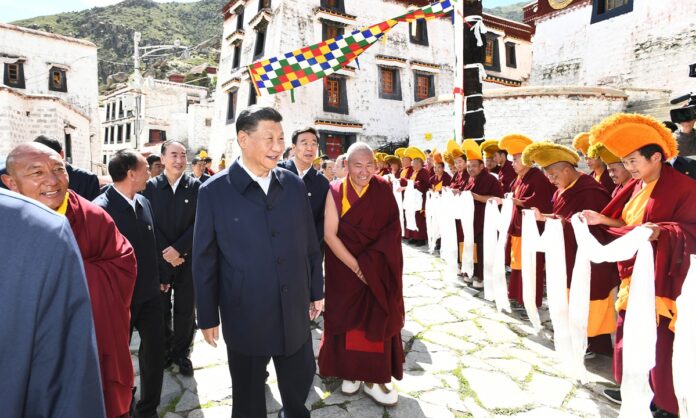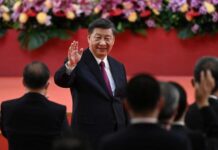(TibetanReview.net, Jul24’21) – China said Jul 23 that the visit to Tibet Autonomous Region (TAR) by China’s top party, army, and government leader Xi Jinping from Jul 21 to 23 was to mark the 70th anniversary of the region’s “peaceful liberation”, which is itself a milestone underlying numerous significant recent developments.
China’s official Xinhua news agency Jul 23 underlined the importance and significance of the visit by saying “President Xi Jinping, also general secretary of the Communist Party of China Central Committee and chairman of the Central Military Commission, visited Southwest China’s Tibet Autonomous Region from Wednesday to Friday for the 70th anniversary of Tibet’s peaceful liberation.” Xi’s visit “was the first time a top Chinese leader has taken part in such a celebration in the history of the Party and the country,” reiterated China’s official chinadaily.com.cn Jul 24.
Xi previously visited the TAR on Jul 21, 2011, when he was the country’s Vice President, to lead a delegation to mark the “60th Anniversary of the Peaceful Liberation of Tibet”.
Xi has driven home the message behind his latest visit and the anniversary by stressing full implementation of the guidelines of the Communist Party of China (CPC) for governing Tibet in a new era and writing a new chapter of lasting stability and high-quality development for the plateau region.
“Promoting the high-quality development of Tibet should be based on the principle that all development is to facilitate ethnic unity and progress, to improve livelihood and unite people, and to elevate the sense of gain, safety and happiness of all ethnic groups,” China’s official globaltimes.cn Jul 23 quoted Xi as saying.
Terms such as “ethnic unity”, “uniting people” and “gain, safety and happiness of all ethnic groups” may sound innocuous and even laudable. But they are actually slogans under which discrimination against and marginalization of the Tibetan people are being carried under a highly invasive Sinicization campaign in what is called the Tibetan regions of the People’s Republic of China.
“All regions and people of all ethnicities in Tibet will march toward a happy life in future,” Xi was seen and heard telling a crowd in one video of his visit, reported Bloomberg News Jul 23.
On Jul 22, Xi was reported to have visited the Drepung Monastery, Barkhor Street and the Potala Palace square in Lhasa to learn about the work on ethnic and religious affairs, the conservation of the ancient city, as well as the inheritance and protection of Tibetan culture. This should be seen in the context of his call for Tibetan Buddhism to be adapted to socialist society under the overall rubric of the ongoing Sinicization campaign.
Significantly, Xi met with the representatives of the Tibet Military Command of the Chinese People’s Liberation Army on the last day of his visit. He stressed that the local troops should fully strengthen the work of training soldiers and war preparation, and contribute positive strength to promote the long-term stability and prosperity of Tibet, noted the globaltimes.cn report.
Referring to his visit to Nyingchi (Tibetan: Nyingtri), located not far from the Indian state of Arunachal Pradesh – which China claims is southern Tibet and therefore part of its territory – the report called it an important and strategic transportation hub along the Sichuan-Tibet Railway, which extends more than 1,740 kilometers from Chengdu, capital of Southwest China’s Sichuan Province, to Lhasa.
A major and strategic section of the railway that connects Lhasa with Nyingchi started operating in June, where China’s most advanced Fuxing bullet train for the first time ran on the Tibetan plateau and passed through the Yarlung Zangbo River.
The report cited Chinese observers as saying the rail line could further enhance Tibet’s status in the national railway network, greatly boost the region’s economic development and even generate an economic radiation effect to neighboring countries.
The strategic significance of Xi’s visit in the backdrop of the ongoing faceoff between Indian and Chinese armies across the Ladakh border has been underlined in Indian media reports.
Xi called on ethnic Tibetans and other minority groups Friday (Jul 23) to help defend the country, reported the ndtv.com Jul 23, citing a Xinhua report.
“His message will be especially troubling for India,” it quoted Robert Barnett, a Professorial Research Associate at SOAS (School of Oriental and African Studies), University of London, as saying as he posted videos showing the Chinese leader speaking to locals. Barnett – who is also a Senior Research Fellow at Hong Kong Baptist University, and a Research Affiliate at the Lau China Institute, King’s College, London – has said Xi’s trip “suggests that he places the border struggle with India close to the very top of China’s national agenda.”
There is nothing unusual about Xi’s visit being unannounced. Visits to Tibet by Chinese leaders are almost always unannounced and underlines the Chinese leadership’s intense distrust of the Tibetan people from the security angle.






